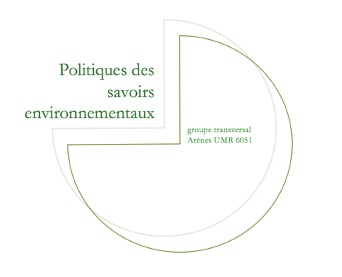
Environmental Knowledge Policy
Battles are being fought over the recognition, resolution, meaning and reality of environmental problems (such as climate change, loss of biodiversity, ocean acidification, pollution, natural resource depletion, etc.). In fighting these battles, multiple knowledge devices (scientific instruments, collection of testimonies, prophecies, expert opinions, etc.) contributing to the social existence of these problems are called upon. The various forms of public action designed to address these problems are based on an intense production and mobilisation of both scientific and lay knowledge. Plural (and sometimes competitive), this knowledge forms the basis of practice, groups and instruments (models, algorithms, information systems and databases, metrological devices, etc.). It also provides the cognitive infrastructure for environmental governance, and is therefore central to environmental regulation at different levels of public action.
The Environmental Knowledge Policy (Politiques des Savoirs Environnementaux [PSE]) Cross-Sectional Research Group is interested in how individuals and groups contribute to the production, dissemination and reception of environmental knowledge. The group thus seeks to use an environmental lens to investigate the role played by scholarly professions (researchers, engineers, teachers, consultants, experts) as well as by scientific, technical and lay knowledge, in public action; the processes through which knowledge is transformed into public action practice, groups and instruments; the dynamics of influence (exercised by private, professional or even state interests) and of contestation (led by mobilised groups or various stakeholders in the construction of problems) to which the production and promotion of this knowledge give rise.
By combining contributions from the sociology of public action, the sociology of collective action, and the sociology of science and knowledge, the PSE Group seeks to address the following questions: 1. How is environmental knowledge formed? 2. How does it spread and how does it become socially available? 3. In what conditions does it prove politically effective (i.e., turn into practice, public action mechanisms, mobilisations, etc.)?
The aim of the PSE Group is to bring together those researchers at the Arènes laboratory who are interested in these issues. The group meets monthly, with a view to supporting both individual and collective research, contributing to the laboratory’s scientific leadership by inviting external researchers, organising events and promoting the scientific production of its members.
In 2021-2022, the PSE Group will focus on the Anthropocene. Initially no more than a controversial stratigraphic name, this term has gradually gained currency in scientific research, activist tracts and parliamentary debates as a way of referring to the overall impact of ‘human activities’ on the ‘Earth system’. Its political value is therefore based on a particular type of causal knowledge, linking ‘environmental degradation’ to various ‘anthropogenic causes’. This belief is sustained through a significant amount of work on the production, dissemination and usage of this knowledge, carried out by a heterogeneous group of actors. We aim to study both these ‘etiological activities’ and the actors who implement them, in order to document the social foundations of what the literature already refers to as the ‘politics of the Anthropocene‘.

